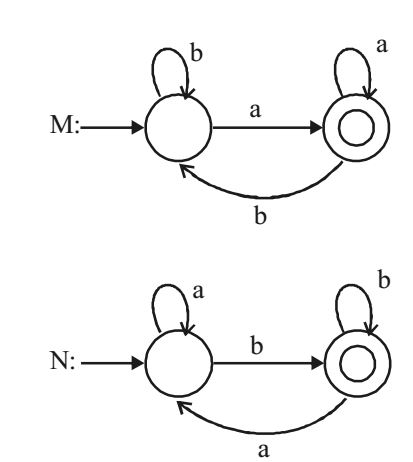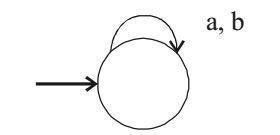Theory of computation miscellaneous
- Let L be the language represented by the regular expression

What is the minimum number of states in a DFA that recognizes L (complement of L)?
-
View Hint View Answer Discuss in Forum
NA
Correct Option: B
NA
- Consider the alphabet ∑ = {0, 1}, the null/empty string λ and the sets of strings X0, X1, and X2 generated by the corresponding non-terminals of a regular grammar X0, X1, and X2 are related as follows. X0 = 1 X1
X1 = 0 X1 + 1 X2
X2 = 0 X1 + {λ}
Which one of the following choices precisely represents the strings in X0 ?
-
View Hint View Answer Discuss in Forum
NA
Correct Option: C
NA
- The number of states in the minimal deterministic finite automata corresponding to the regular expression (0 + 1) * (10) is _______.
-
View Hint View Answer Discuss in Forum
(0 +1)*10

K total minimum DFA states = 3Correct Option: C
(0 +1)*10

K total minimum DFA states = 3
-

Consider the DFAs M and N given above. The number of states in a minimal DFA that accepts the languages L(M) ∩ L(N) is ________.
-
View Hint View Answer Discuss in Forum
M accepts the strings which end with a and N accepts the strings which end with b. Their intersection should accept empty language.

Correct Option: A
M accepts the strings which end with a and N accepts the strings which end with b. Their intersection should accept empty language.

- Consider the following two statements:
I. If all states of an NFA are accepting states then the language accepted by the NFA is ∑*.
II. There exists a regular language A such that for all languages B, A ∩ B is regular. Which one of the following is CORRECT?
-
View Hint View Answer Discuss in Forum
Statement I is not true, because if all the states of DFA are accepting states then the language accepted by the DFA is * å Statement II is true because one can have regular language A = [] [Empty Language] which satisfies the given condition.
Correct Option: B
Statement I is not true, because if all the states of DFA are accepting states then the language accepted by the DFA is * å Statement II is true because one can have regular language A = [] [Empty Language] which satisfies the given condition.

